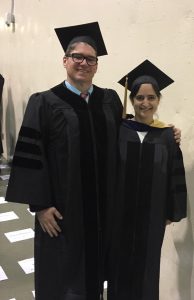 RTC graduate, Joel Beatty, and professor Stefka Hristova have co-authored a chapter in the book, Surveillance, Race, Culture, published by Palgrave Macmillan, 2018. Their chapter is titled “Articulating Race: Reading Skin Color as Taxonomy and as Numerical Data”. According to Dr. Hristova, the chapter “explores the transformation of race into biodata at the turn of the 20th century”. The book is edited by Susan Flynn, University of the Arts, London; and Antonia Mackay, Oxford Brookes University.
RTC graduate, Joel Beatty, and professor Stefka Hristova have co-authored a chapter in the book, Surveillance, Race, Culture, published by Palgrave Macmillan, 2018. Their chapter is titled “Articulating Race: Reading Skin Color as Taxonomy and as Numerical Data”. According to Dr. Hristova, the chapter “explores the transformation of race into biodata at the turn of the 20th century”. The book is edited by Susan Flynn, University of the Arts, London; and Antonia Mackay, Oxford Brookes University.
Paige is a strategic communications professional specializing in higher education, cultural programming, and community engagement. She is an expert in crafting data-driven campaigns that are accessible to diverse audiences. A proud Michigan Tech alum, Paige earned her BS in Scientific and Technical Communication, along with minors in media production and psychology. She resides in Green Bay with her family.
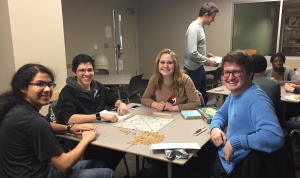 Join us at la Peña, the Spanish conversation hour hosted by the Department of Humanities and the Modern Languages Program. We come together several times during the academic year to speak Spanish in an informal social gathering. Come relax, meet Spanish speakers of all levels, and have a light snack and refreshment. Friends welcome!
Join us at la Peña, the Spanish conversation hour hosted by the Department of Humanities and the Modern Languages Program. We come together several times during the academic year to speak Spanish in an informal social gathering. Come relax, meet Spanish speakers of all levels, and have a light snack and refreshment. Friends welcome!
La Peña is held from 5-6 p.m in Walker 120A. Join us on the following Tuesdays for Fall 2018:
- September 11
- September 25
- October 9
- October 30
- November 13
- November 27
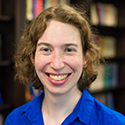 Laura Kasson Fiss presented a paper entitled “The Bodies of the Idler’s Club: A Quantitative Analysis of Column Contributors” at The Body and the Page, an international conference jointly hosted by the Research Society for Victorian Periodicals and the Victorian Studies Association of Western Canada in Victoria, British Columbia.
Laura Kasson Fiss presented a paper entitled “The Bodies of the Idler’s Club: A Quantitative Analysis of Column Contributors” at The Body and the Page, an international conference jointly hosted by the Research Society for Victorian Periodicals and the Victorian Studies Association of Western Canada in Victoria, British Columbia.
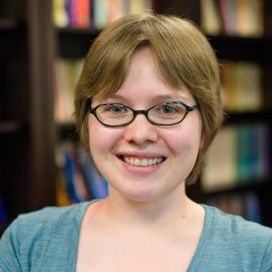 Anna K. Swartz, a graduate of Rhetoric, Theory and Culture, has published the article, The Missing Subject in Schizophrenia, for the Neuroethics Blog at Emory University.
Anna K. Swartz, a graduate of Rhetoric, Theory and Culture, has published the article, The Missing Subject in Schizophrenia, for the Neuroethics Blog at Emory University.
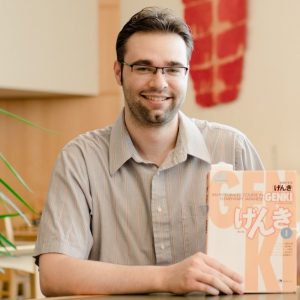 Michigan Tech undergraduate students Matt Luther and Trenton Woodcox are two of four recipients to win a Japan Business Society of Detroit (JBSD) Foundation scholarship to study Japanese language and culture at the Japan Center for Michigan Universities (JCMU) in Hikone, Shiga Prefecture, Japan. They will arrive in September, and study on JCMU’s campus the entire 2018-19 academic year. The $4,000 scholarships will offset travel, tuition and living expenses.
Michigan Tech undergraduate students Matt Luther and Trenton Woodcox are two of four recipients to win a Japan Business Society of Detroit (JBSD) Foundation scholarship to study Japanese language and culture at the Japan Center for Michigan Universities (JCMU) in Hikone, Shiga Prefecture, Japan. They will arrive in September, and study on JCMU’s campus the entire 2018-19 academic year. The $4,000 scholarships will offset travel, tuition and living expenses.
Motivated by career goals, both are certain their year abroad will set them up for success in competitive professions.
Luther, an English major with a minor in teaching English to speakers of other languages (TESOL), says he “was interested in Japanese culture from a young age. After I graduate, I plan to go to Japan to teach English long term.”
Woodcox is pursuing a bachelor’s degree in social sciences with a focus in law and society. Expected to graduate in 2020, he says he wants to “work on international policy or law at the U.N., work at an embassy like the Japanese embassy or work with the CIA in country profiling, so I think (studying abroad in Japan) will definitely help a lot.”
Read the full story on mtu.edu/news.
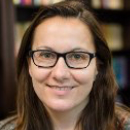 Silke Feltz, a PhD candidate in Humanities, has published a book review of “The Oxford Handbook of Food Ethics,” by Anne Barnhill, Mark Budolfson and Tyler Doggett (Editors) in Metapsychology Online Reviews.
Silke Feltz, a PhD candidate in Humanities, has published a book review of “The Oxford Handbook of Food Ethics,” by Anne Barnhill, Mark Budolfson and Tyler Doggett (Editors) in Metapsychology Online Reviews.
 Anna K. Swartz, a graduate of Rhetoric, Theory and Culture, has a book review of “Phenomenology of Illness” published at Metapsychology Online Reviews.
Anna K. Swartz, a graduate of Rhetoric, Theory and Culture, has a book review of “Phenomenology of Illness” published at Metapsychology Online Reviews.
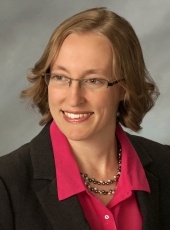 Victoria Sage, technical writer in the Center for Technology & Training (CTT), is the recipient of the 2018 Carmine Palombo Individual Award from the Michigan Transportation Asset Management Council (TAMC). In addition to her duties as a technical writer at the CTT, Sage is editor of the Michigan Local Technical Assistance Program’s The Bridge newsletter.
Victoria Sage, technical writer in the Center for Technology & Training (CTT), is the recipient of the 2018 Carmine Palombo Individual Award from the Michigan Transportation Asset Management Council (TAMC). In addition to her duties as a technical writer at the CTT, Sage is editor of the Michigan Local Technical Assistance Program’s The Bridge newsletter.
In announcing the award, the TAMC notes “Vicki’s work in these roles has been a great service to the TAMC in that many of Vicki’s efforts advance the strategies of the TAMC Work Program through key training and educational initiatives for professionals at local transportation agencies. Vicki has also provided leadership and advocacy of asset management principles as well as communicating relevant programs of the TAMC and transportation agencies across Michigan in helping develop stories in The Bridge.”
One of the driving factors in Sage’s nomination for this award was her role in development of the TAMC Bridge Asset Management Workshop. Using innovative features of common desktop software, she transformed the TAMC training into a focused workshop to quickly and easily create a bridge asset management plan for students attending the training.
“Vicki had a vision to improve the creation of bridge asset management plans, and she developed an innovative way to use everyday tools to help the workshop attendees,” says TAMC Bridge Committee Chair Beckie Curtis. “This innovation has been a game changer in terms of what can be accomplished in the training workshops and making it even easier for people to have a document that they can then use to organize treatments in a way that is financially manageable.”
Transportation asset management is a process of managing public assets, such as roads and bridges, based on the long-range condition of the entire transportation system. TAMC, created in 2002 by the Michigan Legislature, promotes the concept that the transportation system is unified, rather than separated by jurisdictional ownership. Its mission is to recommend an asset management strategy to the State Transportation Commission and the Michigan Legislature for all of Michigan’s roads and bridges.
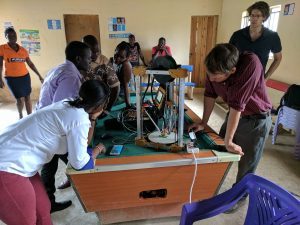 My internship with Kijenzi—a group introducing 3-D printing for medical applications in rural Kenya—was less a formally established involvement, and more a reflection of ongoing efforts I started in summer 2017 and will continue in this summer. I had the opportunity to continue investing my time and energy in a project that I believe in, and to have some tangible return on that investment in the form of credits.
My internship with Kijenzi—a group introducing 3-D printing for medical applications in rural Kenya—was less a formally established involvement, and more a reflection of ongoing efforts I started in summer 2017 and will continue in this summer. I had the opportunity to continue investing my time and energy in a project that I believe in, and to have some tangible return on that investment in the form of credits.
This internship led me to develop and fund a research project, develop a web presence and branding material, and be an integral part of an international interdisciplinary team. I’ve had extensive opportunities to develop my skills as a professional communicator with the variety of work I have been responsible for over the semester and beyond, giving me the hands-on experience necessary to learn a trade. Getting outside the classroom and working on client projects with real-world impacts is an invaluable experience, and I appreciated the chance to work with Kijenzi during the academic year, continuing my involvement in the organization while also advancing my degree at Michigan Tech.
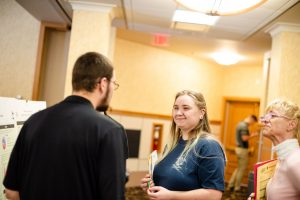 If you want to know if you have a passion for something, you should gain experience in it. Thankfully, Michigan Tech’s University Marketing and Communications department, or UMC, was my opportunity. I spent the past two semesters working in the department as a student writer. I had come into it with no idea what I would gain, but left with some important lessons.
If you want to know if you have a passion for something, you should gain experience in it. Thankfully, Michigan Tech’s University Marketing and Communications department, or UMC, was my opportunity. I spent the past two semesters working in the department as a student writer. I had come into it with no idea what I would gain, but left with some important lessons.
First: planning. Being a college student already requires balance, but put a job on top of that and you have someone in need of Google Calendar. After adding in time for interviews, writing, and meetings, my time soon became thin. Meeting deadlines and creating content I was proud of was crucial to me. If I didn’t make the time, then the words would be bland and unimaginative.
Then I moved into learning about communication. There are so many people within the UMC, from writers to editors to those that make the content accessible. Making sure people know your intentions and plan of attack clearly is important. While this was great to learn, I also found out that sometimes people just won’t answer you and there is nothing that you can do about it.
Lastly, I would say I gained much more respect for people in my field. Of course, not being a part of it before meant I never knew much, but I didn’t realize the amount of work put in. It opened my eyes for me to see that writing wasn’t something that anyone could do, but something people with passion could do. Those who helped make my writing better knew exactly where I was at and gave wonderful ideas to aid me. If it wasn’t for them, I’m not sure I would have continued to love writing. The UMC made me fall in love with being a writer all over again.